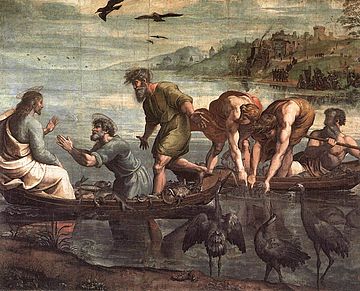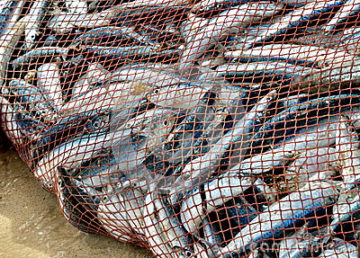In anticipation of the Fifth Sunday of Ordinary Time Franciscan Friar Fr. Paul Gallagher offers us these Gospel Reflections. The content is edited by Franciscan Sister of Christian Charity Sister Anne Marie Lom and Joe Thiel. The excerpts from the Sunday readings are prepared by Joe Thiel. To read or download the complete pdf with excerpts for your prayer, please click here: Franciscan Gospel Reflection February 6 2022 Excerpts are from the Lectionary for Mass for Use in the Dioceses of the United States of America, second typical edition © 2001, 1998, 1997, 1986, 1970 Confraternity of Christian Doctrine, Inc., Washington, DC. Used with permission. All rights reserved. No portion of this text may be reproduced by any means without permission in writing from the copyright owner. Photo: V&A – Raphael, The Miraculous Draught of Fishes (1515) – Miraculous catch of fish – Wikipedia 
Luke 5:1-11
While the crowd was pressing in on Jesus and listening to the word of God, he was standing by the Lake of Gennesaret. He saw two boats there alongside the lake; the fishermen had disembarked and were washing their nets. Getting into one of the boats, the one belonging to Simon, he asked him to put out a short distance from the shore. Then he sat down and taught the crowds from the boat.
After he had finished speaking, he said to Simon, “Put out into deep water and lower your nets for a catch.” Simon said in reply, “Master, we have worked hard all night and have caught nothing, but at your command I will lower the nets.” When they had done this, they caught a great number of fish and their nets were tearing. They signaled to their partners in the other boat to come to help them. They came and filled both boats so that they were in danger of sinking. When Simon Peter saw this, he fell at the knees of Jesus and said, “Depart from me, Lord, for I am a sinful man.” For astonishment at the catch of fish they had made seized him and all those with him, and likewise James and John, the sons of Zebedee, who were partners of Simon. Jesus said to Simon, “Do not be afraid; from now on you will be catching men.” When they brought their boats to the shore, they left everything and followed him.
Background:
The text for last Sunday’s gospel ended with the people of Nazareth wanting to throw Jesus headlong over the hill on which their town had been built (Luke 4:29-30). In the remaining verses of the fourth chapter, Luke describes Jesus’ visit to Capernaum, where he cures a man possessed by a demon. His teaching astonishes the people, because he speaks with authority. Jesus then goes to Simon’s house and cures Simon’s mother-in-law. After sunset, with the Sabbath officially over, people bring their sick for him to cure. Before daybreak the next morning, Jesus leaves Capernaum and seeks out a deserted place. The crowds find him and try to prevent him from leaving. In Mark’s gospel, Peter is the one who tries to prevent Jesus from leaving (Mark 1:36-37). As Luke describes the incident, it is the people themselves who ask Jesus not to leave. This small shift avoids having Peter in the difficult position of trying to prevent Jesus from doing what he knows he must do.
Both Matthew and Mark have similar accounts of the events recorded in today’s gospel. Both of them place it at the very beginning of Jesus’ public ministry, right after Jesus returns from the desert (Matt 4:18-22 and Mark 1:16-20). They also report that Simon’s brother Andrew was also in the boat–a detail that Luke omits. Luke’s description places the emphasis on Peter’s unique relationship with Jesus.
Luke’s placement in his gospel makes the response of the first disciples to Jesus’ invitation to become his followers more plausible. To leave their families, professions, and property to become disciples of Jesus would have amounted to a total disregard for their responsibilities as men of their culture. Luke’s placement of the text at least gives some background and time in which a life-changing decision would have been made by the disciples.
Focusing on the text that is today’s gospel, the region of Gennesaret is in a fertile area near the northern part of the Sea of Galilee. The night is the best time for fishing. Throughout most of the text, Peter is referred to by his Jewish name, Simon. The exception is when he realizes the size of the catch of fish and attributes it to the divine power of God working through Jesus. All Peter can do is kneel before Jesus and ask him to depart. Such a gesture is very meaningful in this culture. Jesus is someone who has abilities that Peter does not. Being a disciple of Jesus requires personal sacrifice. At this point in the text Luke calls him “Simon-Peter,” both his Jewish name and the name that Jesus will give him later in the text when Jesus names his apostles (Luke 6:14).
There is likewise a shift in how Simon addresses Jesus. When Jesus asks Simon to put out into the water and lower his net, Simon calls Jesus “Master” or “Rabbi.” After the experience of the catch of fish, Peter refers to Jesus as “Lord.” All those present, not just Peter, recognize the manifestation of divine power in what has taken place. They are filled with astonishment and fear, the typical response to the near presence of God. Jesus reassures them with the exhortation, “Do not be afraid!” Usually when people are reassured with the greeting, “Do not be afraid,” it signals more than reassurance. God is commissioning those involved in the encounter. God has not acted in an extraordinary way just to brighten the day for some weary fishermen. In the second part of that verse, Jesus tells Simon, James, and John that from now on they will be fishers of men. Luke indicates that the commissioning extends beyond James and John by stating that they left their boats and they followed Jesus.
Reflection Questions
- Have you known someone who made a dramatic change in the way they were living their life? What was your reaction?
- What have been some significant changes that you have made in your life? What were you trying to do by making that change? How was your decision received?
- Have you ever encountered a profound experience of God’s presence? Can you recall that experience, the situation, and the feelings you had at the time?
- Imagine that you are there this morning watching Peter and his companions cleaning their nets, and you hear Jesus asking Peter to put out into some shallow water so that he can teach those gathered. What goes through your mind as you hear Jesus make his request?
- After a time when Jesus is done speaking to the crowd, he once again turns to Peter and asks him to set out into the deep water and lower his nets. What happens within you as you hear this new request of Peter?
- What comes to mind as you think of “the deep?”
- Imagine the nets filled with fish to the point of almost breaking, and the boats being so full of fish that they are almost swamped. What does that scenario evoke for you?
- Can you imagine yourself next to Peter on your knees before Jesus? What would you say?
- Have you ever prayed in similar words to Peter’s, “Get away from me, for I am sinful?”
- Can you talk with God now honestly and frankly about whatever arose within you from this text?


